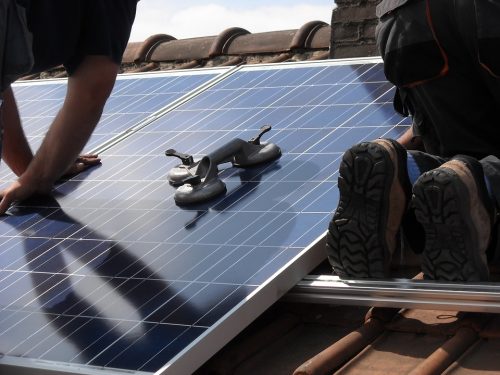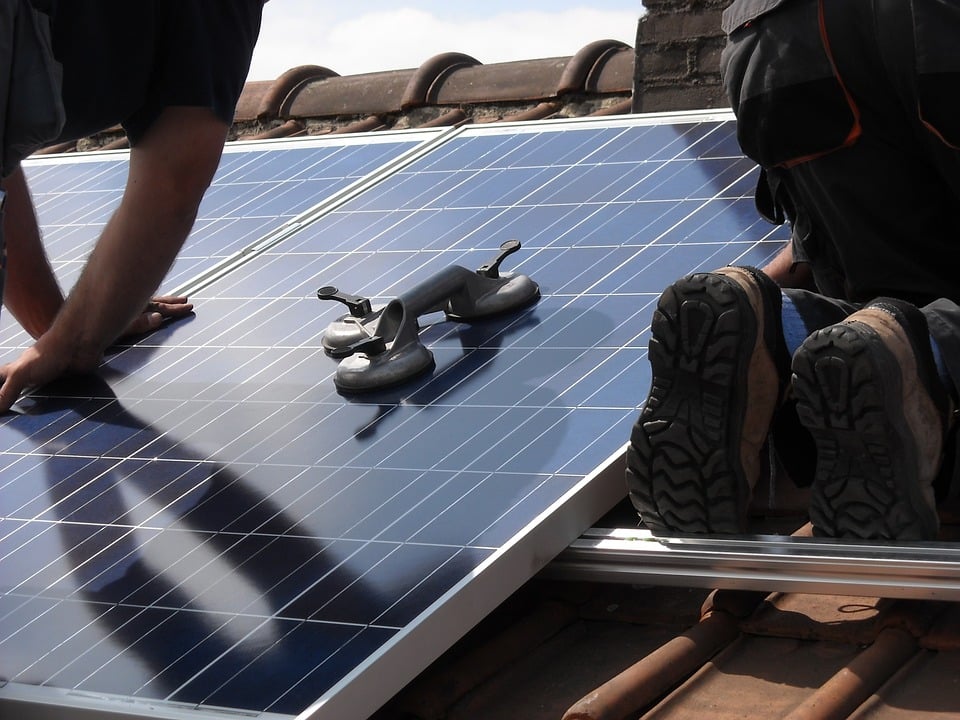Hitachi Europe have confirmed they are taking part in a £10.8 million Smart Energy Islands project – mostly funded with European money – to develop a low carbon community in the Isles of Scilly in the United Kingdom.
The aim of the Smart Energy Islands project is to help the islands move toward a more sustainable, low carbon energy infrastructure.
 The project plans to double solar energy capacity on the islands, partly by installing rooftop solar panels in 100 homes. Image: pixabay-944002
The project plans to double solar energy capacity on the islands, partly by installing rooftop solar panels in 100 homes. Image: pixabay-944002
Hitach Europe are investing £1.4 million in the project. The other investors are: European Regional Development Fund (ERDF, investing £8.6 million); Council of the Isles of Scilly (£0.2 million); Moixa Technology (£0.3 million); and PassivSystems (£0.3 million).
Smart Energy Islands is a key investment for Hitachi Europe. Their managing director, Kazue Abe, says they need to start satisfying customer demand and play a key role in helping to decarbonize the economy.
Reduce bills and move toward low carbon
The project lays the foundations for the Smart Islands programme, which aims to achieve the following by 2025:
– reduce electricity bills by 40 percent
– meet 40 percent of the islands’ energy demand from renewable sources
– run 40 percent of vehicles on electricity or low carbon energy
The Isles of Scilly are situated nearly 30 miles from the UK mainland. There is no gas supply on the islands, so the 2,200 inhabitants are heavily reliant on imported electricity and fossil fuels to meet their energy needs, with the result that they pay some of the highest household energy bills in the UK.
Model that can be replicated in other communities
At present, mains electricity on the Isles of Scilly is supplied by by a single 33,000 volt undersea cable from the mainland, supplemented by an island-based diesel-fuelled power station and a few locally-controlled generators.
The islands’ economy is low-wage, and dominated by agriculture and tourism. A large number of homes have inefficient heating systems, which, together with high fuel costs, means fuel poverty affects 22 percent of households, one of the highest rates in the UK.
The project will initially focus on 100 homes and 200 businesses in the Isles of Scilly and Cornwall.
It offers an opportunity to develop and test innovative technologies in a model that can then be replicated at different scales in other communities.
The project plans to double solar energy capacity on the islands, which currently stands at 270kW, mostly generated from rooftop solar panels. Another 100 homes will have photovoltaic (PV) panels installed and two 50kW solar gardens are also being built.
Internet of Things to manage electricity loads
Hitachi will be developing an Internet of Things (IoT) that will manage electricity loads in homes and businesses, as well as in electrical vehicles, and other infrastructures.
Moixa, the UK’s leading smart home battery company, will be developing systems that allow the IoT to manage electric vehicles and smart home batteries to help balance supply and demand within the islands’ energy grid.
PassivSystems, a leading home energy services company, are supplying the home energy management systems for managing the demands from domestic properties, and they are also supplying energy monitoring systems for commercial properties.
Amanda Martin, Chairman of the Council of Isles of Scilly, gave a positive welcome to the start of the Smart Energy Islands project and reiterated its aim “to deliver the Isles of Scilly’s main infrastructure and energy requirements in a sustainable and affordable way, whilst providing social benefits such as skills training and innovative healthcare solutions.”

